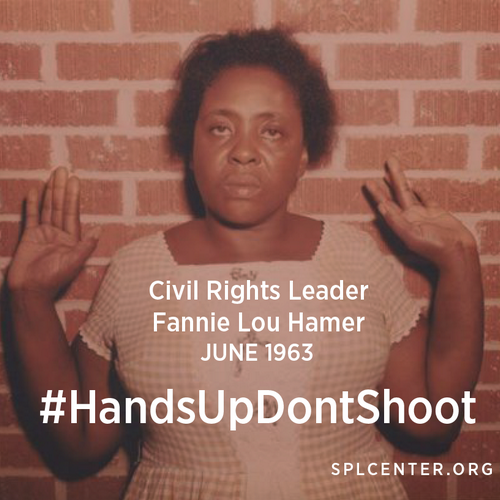Erasing Fannie Lou and Other Black Women Victimized By Police…
Another man/boy shot (not again). Unarmed (his black skin is weaponized). Killed by cops (since slavery). The terrible ever-expanding litany of names: Amadou, Sean, Oscar, Rodney, Trayvon, Michael… We’re on a first name basis (excruciatingly familiar). Collective mourning and grief ensue (my tear ducts are dried out; there’s only rage). Calls for justice in the black community (justice is prosecution and prison). #BlackLivesMatter on a social media loop (numbing). We are trying to convince ourselves that it’s true (we don’t fully believe it). Please make it true (it’s a symbolic prayer).
In the background, a faint sound (a whisper). Aiyanna, Tyisha, Renisha, Rekia (background noise). Woman/girls shot (do they shoot black girls & women?). Unarmed (her skin is a bullet magnet). Killed by cops (since slavery). They are not household names (excruciatingly unfamiliar). A few people mourn (silently). Some calls for justice (more prosecutions and prison). #BlackLivesMatter? (But which ones?)
You’re so selfish. This isn’t the right time, the voice intones. Is that voice in my head? I can’t tell. There never seems to be a ‘right’ time to remember the names of murdered black women (never). Sadness and grief threaten to overwhelm (so tired). Stubbornly I remember (an act of defiance).
In 1999, Tyisha Miller was on her way to a party with her cousin when her car got a flat tire. They pulled into a gas station in downtown Riverside, California. Her cousin went to get help and left Tyisha who had been drinking alone in the car. Miller apparently passed out with the doors locked. She had a handgun on her lap.
A few minutes later, four Riverside police officers (all of them white) who had been called to the scene tried to wake Tyisha to no avail.
They smashed the driver’s side window and chaos ensued. At least one of the cops thought that he saw Tyisha reach for her gun. The officers fired 27 shots into the car and Miller was hit 12 times. She died.
Black people are always reaching for guns…
In the mugshot photo, Fannie Lou Hamer has her arms up in the universal surrender pose (or is it universal?).
The photo circulates on social media. Re-purposed and remixed for a new generation to memorialize a 21st century police execution. The sampled track of a new freedom song. “Hands Up, Don’t Shoot!” the protesters chant.
Fannie Lou stares back at us from behind the lens (hands up, don’t shoot?). What percentage of people who see the mugshot (without the explanatory text) know of Mrs. Hamer, let alone her abuse by police? (15%).
The monster is insatiable and needs to be constantly fed. More images from black struggle, more trafficking in black death (blackness is property; we don’t belong to ourselves). Hungry for more… to consume and exploit. Black suffering erased again. Fannie Lou’s suffering invisible and (un)felt. Mrs. Hamer warned us: “A black woman’s body was never hers alone.” Our bodies are common property still; no boundaries bound to be respected. The cause is bigger than individual pain (right?).
Tell us what happened to you in Winona, Mrs. Hamer? (can the dead talk?). Danielle McGuire tells the story:
After being arrested with other Student Nonviolent Coordinating Committee (SNCC) activists for desegregating a restaurant, Hamer received a savage and sexually abusive beating by the Winona police. “You bitch,” one officer yelled, “we going to make you wish you was dead.” He ordered two black inmates to beat Hamer with “a long wide blackjack,” while other patrolmen battered “her head and other parts of her body.” As they assaulted her, Hamer felt them repeatedly “pull my dress over my head and try to feel under my clothes.” She attempted to pull her dress down during the brutal attack in order to “preserve some respectability through the horror and disgrace.” Hamer told this story on national television at the Democratic National Convention in 1964 and continued to tell it “until the day she died,” offering her testimony of the sexual and racial injustice of segregation.’”(p.910)
Some say that you purposely underplayed the sexual violence associated with the beating that you received in jail, Mrs Hamer (were you ashamed? you did nothing wrong). Black women are also victims of police violence. The beat goes on. Is it the right time to bring this up yet?

